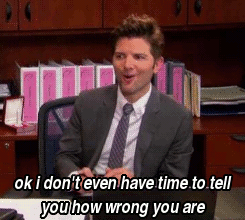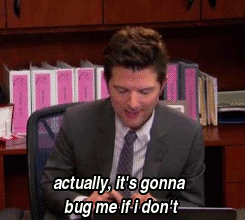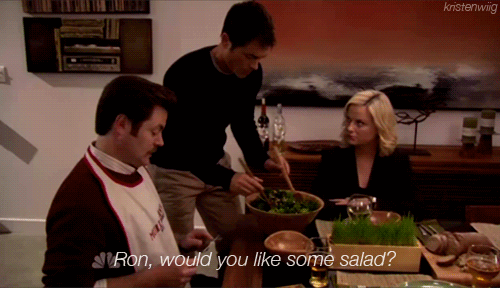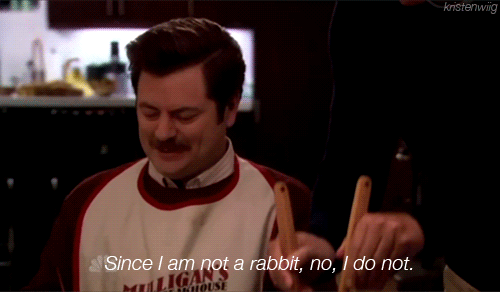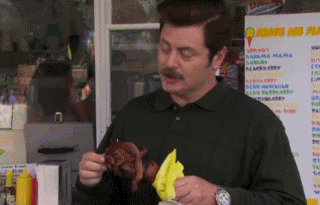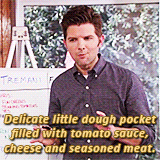“There are only three ways to motivate people: money, fear, and hunger.” Ron Swanson
Isn’t it a buzzkill when you publish an awesome blog post only to have someone bring it to your attention that you made a silly mistake, like using “affect” instead of “effect”? Or maybe you wrote “lose” when you really meant “loose,” or you confused “whose” with “who’s.”
Of course, you can go back and edit, but it’s difficult not to wonder just how many people noticed your misstep. The worst part is people invariably spot mistakes of this kind. And a lot of them are simply itching to do this:
In this kind of situation, you can beat yourself up, wallow, and act defeatist.
You can resent both the person who brought to your attention the mistake and the confusing nature of the English language.
Or you can try to prevent an occurrence like this in the future with this quick, easy-to-understand guide to some commonly confused words. Maybe you learned the difference between “affect” and “effect” way back in grammar school and forgot it. Or maybe you think you know how “who’s” differs from “whose,” but you’re not totally sure (no shame, we all mess up sometimes).
Now, unless you’re a wordsmith, your feelings about vocabulary and grammar are probably best summed up with this:
So even if your only motivation for learning more about vocabulary and grammar is the fear of looking stupid or the fear that an error will cause people to doubt your credibility and expertise, we can work with that.
Affect/Effect
“Affect” is usually a verb. It means “to influence.”
How will the government shutdown affect the citizens of Pawnee?
Ben plans to take a new job in Washington. His move will undoubtedly affect his relationship with Leslie.
It can also mean “to put on a false show.”
Ron affects indifference, but he secretly cares about his coworkers.
“Effect” is usually a noun, and it means “a result” or “something brought about by a cause.” (You’ve heard people talk about causes and effects.)
Waffles have a positive effect on Leslie: they make her happy and excited.
Tom’s decision to tweet while driving had a negative effect: it caused him to get into an accident.
I said that “affect” is usually a verb and “effect” is usually a noun. It wouldn’t be a vocabulary lesson if there weren’t some slightly confusing exceptions, would it?
The truth is that “affect” can be a noun. In the field of psychology, it’s the mood that someone displays. Psychologists may say an individual has a positive affect if that person is joyful/energetic/enthusiastic. Someone could also exhibit a negative affect or a flat affect.
April speaks in a deadpan voice and often displays a flat affect when she interacts with others.
And “effect” can be a verb. It means “to bring about” or “to accomplish.”
Leslie Knope runs for city council because she wants to effect positive change in Pawnee.
Leslie will try to effect a solution to the problems that plague Pawnee government.
Lose/Loose
“Lose” is a verb.
Leslie hopes she doesn’t lose the race to Bobby Newport.
“Loose” is an adjective.
You could say the screws in Ron Swanson’s brain are a little loose.
Worse/Worst
Use “worse” when you’re comparing two items. “Worst” is a superlative, so if you say something is “the worst,” that means it’s the most terrible/horrible thing.
Ron Swanson once said, “Capitalism is the only way, Leslie. It’s what makes America great. And England OK and France terrible.” So according to Ron:
England is worse than America.
Here I’m comparing two different countries (England and America), so I use “worse.”
France is the worst.
Here I’m saying that France is the most awful of the three countries to which Ron referred.
One more example:
Tom thinks that living without technology is worse than spending time in jail.
I’m comparing two things (living without technology and spending time in jail), so I describe one of these things as ‘worse than’ the other.
Tom thinks life without an iPhone is the worst!
Here I’m saying that life without an iPhone is the most terrible/awful thing, so I use “worst.”
I.E./E.G.
Some people use the abbreviations “i.e.” and “e.g.” interchangeably, but they actually don’t mean the same thing. “I.e.” is a Latin abbreviation for id est, which means “that is.” Use “i.e.” when you want to say “in essence” or “in other words.”
Ron Swanson is a true carnivore, i.e., he refuses to eat vegetables.
I said that Ron Swanson is a carnivore, and then I used “i.e.” to further clarify this statement and explain what I meant in another way. The sentence means this: Ron Swanson is a true carnivore. By that I mean he absolutely refuses to eat vegetables.
Rent-a-Swag is like many of Tom’s other business ideas, i.e., kind of ridiculous.
Again, I use “i.e.” to clarify my previous statement and explain it in a different way. The sentence means this: Rent-a-Swag is like many of Tom’s other business ideas. That is, it’s kind of ridiculous.
“E.g.” stands for exempli gratia, which means “for the sake of example.” Use “e.g.” to give an example.
Ron Swanson loves all types of meaty dishes, e.g., bacon, burgers, pork chops, turkey legs.
Here I’m listing examples of the types of meaty dishes that Ron loves.
Tom has many unique names for food, e.g., apps, zerts, bean blankets, super water, sandoozles.
I use “e.g.” because I’m listing examples of the weird names Tom has for food.
Do You Have To Italicize “I.E.” and “E.G.”?
No.
Do You Put A Comma After “I.E.” and “E.G.”?
This is a stylistic choice, and most style guides advise using a comma.
Do You Set Aside the Words That Follow “i.E.” or “e.G.” With Parentheses or With a Comma?
You can do both. I used a comma above, but I also could have written a sentence like this:
Ron Swanson loves all types of meaty dishes (e.g., bacon, burgers, pork chops, turkey legs).
Disinterested/Uninterested
If you’re disinterested, you’re impartial and unbiased. You don’t take sides, and you’re not personally invested in the outcome.
I hope that a disinterested judge presided over Ron and Tammy’s divorce hearing.
If you’re uninterested, you’re bored; you’re not engaged; you’re unconcerned.
In the first season of ‘Parks and Rec,’April was an uninterested summer intern.
Who’s/Whose
“Who’s” is a contraction for “who is” or “who has.”
Who’s going to pay for Leslie and Ben’s wedding?
Who’s the councilman with the nice hair?
“Whose” is possessive.
Whose bacon is this? It must be Ron’s.
Whose calzone is this? Well, given Ben’s fondness for calzones, it must be his.
It’s/Its
“It’s” is a contraction for “it is” or “it has.”
It’s going to be difficult to convince Ron to eat a banana.
It’s been a few years since April and Andy got married.
“Its” is possessive.
Parks and Rec aired at 8:30 pm during its first two seasons.
Treat Yo Self
Now that we’ve tackled these 14 confusing words and you’ve improved your vocabulary and grammar, you can definitely reward yourself. I think it’s fitting that I end this post about words with three words everyone loves to hear:
Sources for GIFs:
Every Time I Come in the Kitchen
Parks and Recreation Tumblr
Funny or Die



